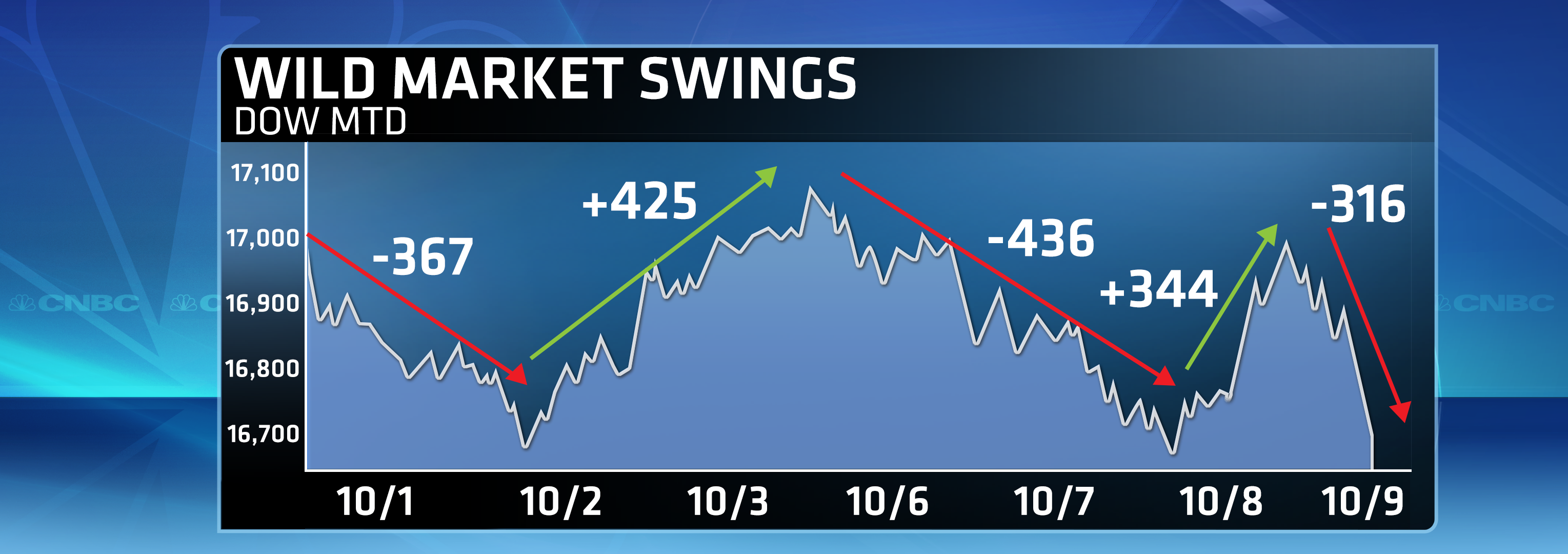US Markets
U.S. stocks sank on Thursday, erasing all and more of the
previous day's rally, as investors bypassed U.S. corporate earnings and
economic reports to focus on global concerns, including Europe's
softening economy.
"We've added global growth concerns on top of
other headline risks, (such as) air strikes, Ebola," said Sean McCarthy,
regional chief investment officer for Wells Fargo Private Bank.Ahead of Wall Street's start, data showed a 5.8
percent drop in German exports in August, adding to downbeat numbers
that had German industrial orders and output falling as well.
"Europe's growth is weak, and close to going into recessionary like conditions; everyone is waiting for the bazooka to be fired," said Mark Luschini, chief investment strategist at Janney Montgomery Scott. Stocks furthered their losses after European Central Bank President Mario Draghi said there are indications that the euro zone's economic growth is slowing and that central bankers should strive to boost inflation.
"To some extent we've lost the optimism that drove the markets higher over the course of the year, whether it's worry about the impact of people dying of the latest contagion, whether worry about what will happen when the Fed is no longer pumping money into the economy, or Europe and the slowing there," said Bruce McCain, chief investment strategist at Key Private Bank.
After rising to 19.38, its highest level since Feb. 6, the CBOE Volatility Index, a measure of investor uncertainty, rose 24 percent to 18.76. The Russell 2000 Index of small-cap companies fell 2.7 percent.
Gap fell sharply after the retailer tallied disappointing sales in September and said its chief executive officer would depart; PepsiCo gained after hiking its outlook, and Apple rose after Carl Icahn called on the technology company to increase its share buybacks.
Read MoreMidday movers: Tesla, Apple, Yelp & more
The market's decline "certainly isn't any of the U.S. news; jobless claims continue to point to a sturdy labor market," Luschini said of the number of Americans filing for jobless benefits, which declined last week, with the four-month average hitting an eight-year low.
Separately, wholesale inventories rose 0.7 percent in August, compared to expectations of a 0.3 percent gain.
"We need to wipe out some valuation excess to de-rate to a level that is more indicative of this two-speed global economy, where the U.S. looks good but the rest of the world looks suspiciously weak," Luschini said.
"Europe's growth is weak, and close to going into recessionary like conditions; everyone is waiting for the bazooka to be fired," said Mark Luschini, chief investment strategist at Janney Montgomery Scott. Stocks furthered their losses after European Central Bank President Mario Draghi said there are indications that the euro zone's economic growth is slowing and that central bankers should strive to boost inflation.
"To some extent we've lost the optimism that drove the markets higher over the course of the year, whether it's worry about the impact of people dying of the latest contagion, whether worry about what will happen when the Fed is no longer pumping money into the economy, or Europe and the slowing there," said Bruce McCain, chief investment strategist at Key Private Bank.
After rising to 19.38, its highest level since Feb. 6, the CBOE Volatility Index, a measure of investor uncertainty, rose 24 percent to 18.76. The Russell 2000 Index of small-cap companies fell 2.7 percent.
Gap fell sharply after the retailer tallied disappointing sales in September and said its chief executive officer would depart; PepsiCo gained after hiking its outlook, and Apple rose after Carl Icahn called on the technology company to increase its share buybacks.
Read MoreMidday movers: Tesla, Apple, Yelp & more
The market's decline "certainly isn't any of the U.S. news; jobless claims continue to point to a sturdy labor market," Luschini said of the number of Americans filing for jobless benefits, which declined last week, with the four-month average hitting an eight-year low.
Separately, wholesale inventories rose 0.7 percent in August, compared to expectations of a 0.3 percent gain.
"We need to wipe out some valuation excess to de-rate to a level that is more indicative of this two-speed global economy, where the U.S. looks good but the rest of the world looks suspiciously weak," Luschini said.
After a 345-point drop, the Dow Jones Industrial Average fell 334.97 points, or 2 percent, to 16,659.25, with Caterpillar leading blue-chip losses that extended to all 30 components.
The S&P 500 fell 40.68 points, or 2.1 percent, to 1,928.21, with energy slammed the most and all 10 of its main industry groups in the red.
The Nasdaq declined 90.26 points, or 2 percent, to 4,378.34
For every share rising, nearly eight fell on the New York Stock Exchange, where nearly 896 million shares traded. Composite volume cleared 4.3 billion.
After a drop below 2.3 percent, the yield on the 10-year Treasury note used to figure mortgage rates and other consumer loans held at 2.332 percent.
"The 10-year Treasury yield is below important long-term support near 2.33 percent, which it needs to hold on a consecutive weekly closing basis, according to our work, in order to prevent a test of secondary support in the 2.00 percent -2.10 percent area," Katie Stockton, chief technical strategist at BTIG, wrote in a morning note, issued as the yield fell as low as 2.2799 percent, according to data provided by FactSet.
The dollar reversed higher against the currencies of major U.S. trading partners.
On the New York Mercantile Exchange, commodities were mixed, with gold futures for December delivery rising $19.30, or 1.6 percent, to $1,225.30 an ounce, and the November crude-oil contract falling to $85.28 a barrel.
On Wednesday, stocks rallied as the Federal Reserve signaled it would likely hold interest rates near zero on worries that a slowdown in the global economy and the stronger dollar could dampen the U.S. recovery.
"The 10-year Treasury yield is below important long-term support near 2.33 percent, which it needs to hold on a consecutive weekly closing basis, according to our work, in order to prevent a test of secondary support in the 2.00 percent -2.10 percent area," Katie Stockton, chief technical strategist at BTIG, wrote in a morning note, issued as the yield fell as low as 2.2799 percent, according to data provided by FactSet.
The dollar reversed higher against the currencies of major U.S. trading partners.
On the New York Mercantile Exchange, commodities were mixed, with gold futures for December delivery rising $19.30, or 1.6 percent, to $1,225.30 an ounce, and the November crude-oil contract falling to $85.28 a barrel.
On Wednesday, stocks rallied as the Federal Reserve signaled it would likely hold interest rates near zero on worries that a slowdown in the global economy and the stronger dollar could dampen the U.S. recovery.
—By CNBC's Kate Gibson
Coming Up This Week:
Friday
Earnings: Fastenal, Infosys, Progressive
IMF fall meeting
8:30 a.m. Import prices
9:00 a.m. Philadelphia Fed's Plosser on monetary policy
1:00 p.m. Kansas City Fed President Esther George on economy
2:00 p.m. Richmond Fed's President Jeffery Lacker on the economy
2:00 p.m. Treasury budget
Coming Up This Week:
Friday
Earnings: Fastenal, Infosys, Progressive
IMF fall meeting
8:30 a.m. Import prices
9:00 a.m. Philadelphia Fed's Plosser on monetary policy
1:00 p.m. Kansas City Fed President Esther George on economy
2:00 p.m. Richmond Fed's President Jeffery Lacker on the economy
2:00 p.m. Treasury budget













0 σχόλια:
Δημοσίευση σχολίου
Ο σχολιασμός επιτρέπεται μόνο σε εγγεγραμμένους χρήστες